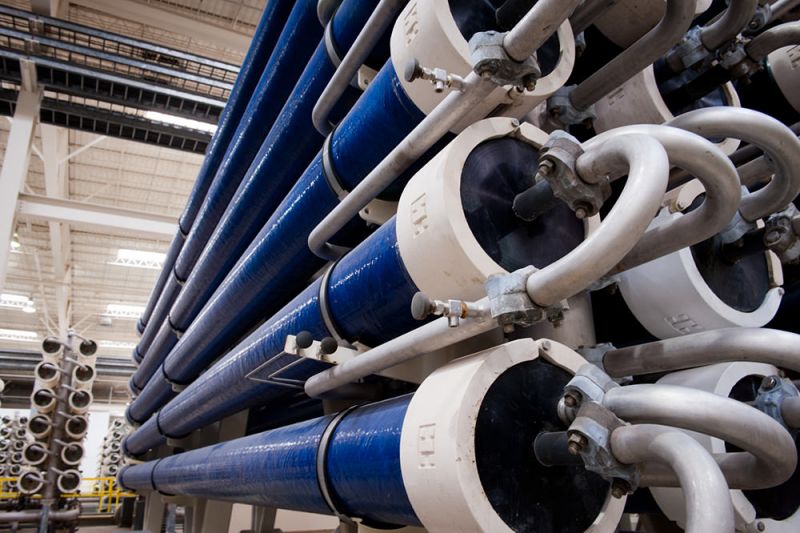16 Projects to Receive $3.5 Million for Desalination and Water Purification Research
Published on by Water Network Research, Official research team of The Water Network in Government
US Bureau of Reclamation Commissioner Brenda Burman announced that 16 entities will receive $3.5 million for laboratory and pilot-scale research projects as part of the Desalination and Water Purification Research Program.
The DWPR Program works with Reclamation researchers and partners to develop more innovative, cost-effective and technologically efficient ways to desalinate water.

Filters in a desalination plant. Source: USBR
“Desalination is an increasingly important source of water for Western communities" Commissioner Burman said. "Investing in innovative technologies to make desalination more affordable and energy-efficient will help many communities across the United States.”
Nine laboratory projects and seven pilot-scale projects were selected for funding. A laboratory-scale study is typically a bench scale study involving small flow rates. They are used to determine the viability of a novel process, new materials, or process modifications. Research at this stage often involves a high degree of risk and uncertainty.
A pilot-scale project tests a novel process at a sufficiently large scale to determine the technical, practical, and economic viability of the process and are generally preceded by laboratory studies that demonstrate if that the technology works. The $3.5 million will be matched with $4.8 million in non-federal funding.
The nine laboratory projects are:
- Argonne National Laboratory – Compressible foam supercapacitor electrodes for energy-efficient and low-cost desalination. $150,000
- Colorado State University – Developing relationships between mineral scaling and membrane surface chemistry to improve water recovery of inland brackish water desalination. $133,634
- Fraunhofer USA, Inc – Plasma activated biochar for high-efficiency capacitive desalination. $72,173
- New Mexico State University – Portable wind turbines for potable water through electrodialysis treatment. $150,000
- Trussel Technologies, Inc. – Novel online surrogates to monitor reverse osmosis performance in reuse applications. $150,000
- University of Arizona – Near zero-liquid discharge water reuse with a closed-circuit ozone-membrane distillation process. $146,361
- University of California, Davis – Flow cytometric monitoring of waterborne pathogens to facilitate water treatment and direct potable water reuse. $149,178
- University of Notre Dame – High performance biocatalytic membranes with cell surface display enzymes for improved concentrate management. $149,995
- Vanderbilt University – Polyelectrolyte/Micelle multiplayer nanofiltration membranes with drastically enhanced performance. $150,000
The seven pilot-scale projects are:
- Carollo Engineers, Inc – Pilot testing a two-stage, fixed bed biotreatment system for selenium removal. $279,246
- Gradiant Osmotics, LLC – Counter flow RO - Innovative desalination technology for cost-effective concentrate management and reduced energy use. $400,000
- Massachusetts Institute of Technology – Pilot testing dynamic optimized, photovoltaic-powered, time-variant electrodialysis reversal desalination system. $400,000
- New Mexico Institute of Mining and Technology – Geothermal membrane distillation for large-scale use. $200,000
- New Mexico State University – Assessment and implementation framework for transboundary brackish groundwater desalination in south-central New Mexico. $399,353
- The City of Daytona Beach – Tracking the occurrence and removal of microbial and toxic hazards during potable reuse through online monitoring and advanced analytics. $400,000
- University of California, Riverside – Innovative water reuse systems harnessing chloramine photochemistry for potable water reuse. $200,000
The DWPR program is supporting the Department of the Interior's priorities, including: creating a conservation stewardship legacy second only to Teddy Roosevelt, utilizing our natural resources, and restoring trust with local communities, among others.
To learn more about Reclamation's Desalination and Water Purification Research Program and see complete descriptions of the research projects please visit www.usbr.gov/research/dwpr.
Source: USBR
Media
Taxonomy
- Treatment
- Treatment Methods
- Filtration
- Decontamination
- Technology
- Filtration Solutions
- Filtration
- Desalination
- Thermal Desalination
- Solar Desalination
- Filtration
- Sea Water Desalinisation
- water treatment
- Desalination